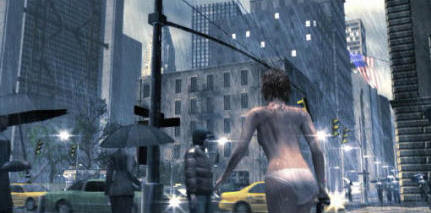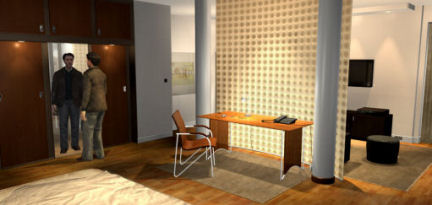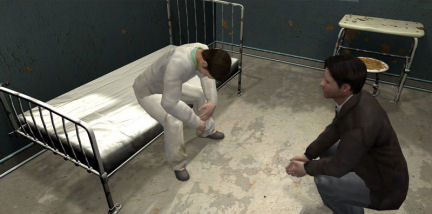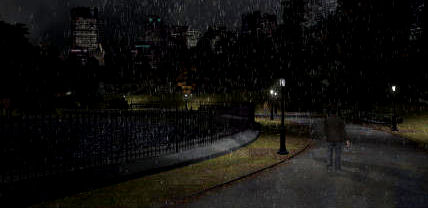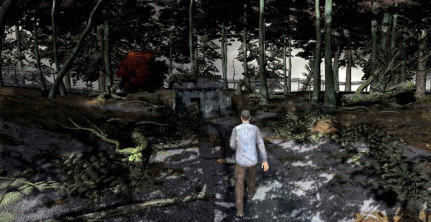|
A First Glimpse of Overclocked: The Game and the Man Behind It By nickie
Overclock (Wikipedia): “…the process of forcing a computer component to run at a higher clock rate than it was designed for or was designated by the manufacturer. As an overloaded computer operates outside of the manufacturer’s recommended operating conditions, it may function incorrectly leading to system instability.” Blending fiction and reality to illustrate the world zeitgeist has been a strong point in the games from House of Tales. Overclocked is their latest offering, a brooding thriller that builds up momentum as it plays like a Hitchcock movie. The game begins with a nightmare, violent scenes bombarding the senses. We then see a scene that is relevant to the story where a scantily clad, bloodied woman runs crazed through the rainy streets of New York City, firing a gun into the air and screaming in anguish.
When game play begins as our character Dave McNamara, we soon discover that he is a forensic psychiatrist specializing in trauma. He’s been sent to investigate five cases of young people who were picked up on the streets, each suffering from amnesia and each carrying a gun.
With his own method of aiding their memory through reverse recollections and the use of ambient objects, he begins to see a picture forming of a frightening truth. The game lulls at first with the hypnotic rain and the slow pace as we familiarize ourselves with Dave and his new job, but then little by little the prickles of unease you feel on your neck indicate that there is much more going on in this scenario. What private demons is our character battling, and why do so many things seem to be going wrong for him? From a jealous coworker to a non-working cash machine, the feelings of angst feel all too much like an experience the player could have any day. Where some games may use spooky music or something leaping out to frighten you, this game employs a masterful touch of reaching into your mind and chilling you to the bone. The subject matter is dark, disturbing and of a mature nature, but essentially elevates the adventure game to a powerful message to the human spirit.
The landscape graphics are extremely well done through shading and lighting, and atmosphere abounds. Mirrors reflect spattered windows and the rain outside falling on the city that never sleeps. Lightning is ominous in the sky. Binoculars give us a closeup view of the breakwater dashing against a pier. Paint is peeling in a mental institution that should have long been closed down. The characters move naturally, and each person in the game is unique and recognizable. There are some interesting effects through the occasional use of split screen to see two scenes at once, such as what two different people are doing at the same time.
“Every shot that kills ricochets.” – Gilbert Parker Game installation and play itself is simple and smooth, and was glitch free on my computer. It’s in DVD format. This is a third person game, point and click. Not only do you play as the main character, but with the use of flashbacks, you additionally play as five other people. While the overarching game proceeds forward, at the same time you are piecing together the story by going backwards chronologically in time through the memories of the patients. The characters come to life through their intricate relationships with each other. Gritty and realistic, we could be there. Inventory is limited in nature and shown at the bottom of the screen, and the objects contained within are those that would realistically be carried by a person and realistically used in the real world. When you click on an item in inventory or a hotspot on the screen, icons appear for further play, such as look at the object for descriptive information, pick it up, use it and so forth. You can save at any point outside of the cut scenes, but the game also keeps track of where you are, and will resume from the point you stopped play.
The puzzles are logic or inventory based. Most of what you will encounter is putting together the pieces of the story backwards through using the patient recollections in the appropriate order to make them cohesive to the whole and spark other patient’s memories. The inventory puzzles are realistic, and dialog often hints what the appropriate next step should be. This is a thinking man’s game, but not in the traditional sense of mind bending puzzles to solve.
To try and get into the mind of the man behind Overclocked, I was fortunate enough to catch up with Martin Ganteföhr of House of Tales developers. Since 1996, Martin has partnered with Tobias Schachte in the gaming world, previously creating The Moment of Silence and The Mystery of the Druids.
Thanks so much, Martin, for doing this interview for GameBoomers! Hey Nickie. Good to talk to you again.
Would it be accurate to say that you regard developing a game as not only an offering in entertainment, but also a means to educate or focus attention of the gamer through social commentary? Do you feel compelled to do so? I’m recalling a statement you made in 2005, “I didn’t write the game to make people forget about reality, but rather to make them look at reality through the glasses of fiction.” Well, the quote still holds true for me. What I’ve tried to say is that I don’t view our work as a simple means of escapism. Like all games, our games set up an alternate reality -- but I don’t want it to make actual real life reality invisible. On the contrary, I think every work of fiction has the potential to make aspects of real life reality MORE visible. It’s not my intention to educate or lecture anyone. We don’t do “Serious Games”, we have no educational goals. I simply want our games to be entertaining in that they take their players seriously. What I’m trying is to use my modest possibilities to get a little nearer to some of the things that I feel and think. That doesn’t necessarily mean giving answers. But it does mean asking questions.
Do you include scenes that you know may be disturbing to the gamer in order to elicit a particular emotion to make a point? We know there are some rather tough scenes in the game. We didn’t include the scenes to disgust people. Every one of us has the potential to do questionable things. Your average ultra-violent war game or gangsta game will set up a simple justification context, maybe even reverse the entire moral system, and then let you kill hundreds in the name of some now-acceptable cause. We put the players through some very rare questionable scenes; not to enjoy the violence, but to question it. I know it’s dangerous to include stuff like that. It threatens the bond between the player and the player character. But it’s a game about the ambivalence of certain feelings and circumstances, and that’s why I wanted those ambivalent scenes to be there.
Because of the quality of your games, it is easy to forget that they are made essentially by only you and Tobias Schachte. Do you come up with ideas that are difficult for Tobias to program, and if so, how do you resolve the problem? Many years ago, that used to be a problem for me. A single sentence in a script can mean impossible tasks for the artists and programmers. It’s really easy to dream up scenes with gigantic alien cities, where thousands of flying cars hover over buildings with artificial waterfalls, and millions of extravagantly dressed two-headed people wander in the streets. I can write that in one minute. But then, somebody has to model all those characters, and program their agendas, and animate their city, which will require an additional set of engine features, and take half a year of work for 20 people, and cost half of the game’s budget -- and still not look as it was originally envisioned… Yeah. So that’s the story of how my genius Alien City With Two-Headed Inhabitants script got cancelled. Ever since, I’ve become very cautious with what I write. I know the limitations, and it’s become natural for me to work within them. When I think that something IS feasible, however, and the idea or scene is important to me, then Tobias and I have a standard procedure of dealing with it: we’ll yell at each other for 20 minutes, and then sit down and discuss how we can make it work.
Do you discard a great many ideas for games before one takes hold and you commit to it? What influences your decision? The idea part is the fun part. It mostly involves lying on sofas and staring out windows and waiting for something to happen. Once something DOES happen, things become complicated. An idea must pass a three-piece test. First, do I love this enough to spend two-and-a-half years of my life with it? Is it worth that? Second, is it feasible? Can we do it? And third: does anyone need this at all? Is there a remote chance to get this thing sold? Like many colleagues, I have collected a number of ‘ideas to get back to at some point’ in my drawer. Strangely enough, I never actually do get back to them. I guess it’s just comforting to keep them. It supports the illusion to be prepared for the worst case.
Was Cory Doctorow an influence on Overclocked? How about your playing of Grand Theft Auto: San Andreas? No, Doctorow’s Overclocked had nothing to with ours. I knew his work for Boing Boing – but I think he announced his novel a longer while after we’d started the game and made the title research. I came across the like-named novel project a year or so later, when I made a Google query, and was quite surprised about the coincidence. I guess there are always things that are somehow in the air, and then happen independently, but simultaneously. About GTA – you’re referring to that one reference, right? Well, GTA is a very, very remote influence in being a remarkably violent game. But I must point out that it’s not me who makes a reference to it in Overclocked. It’s one of the characters. There’s a difference, of course.
More about influences – first, I appreciate how accessible you’ve made yourself to fans. I think it is the mark of an exceptional developer to extend yourself in this way. I’m recalling my favorite quote from you, “Learn to deal with reviewers in a professional, balanced way. Send them death threats, but take their valid points to heart for the next time around.” What feedback from The Moment of Silence did you take to heart when you made Overclocked? It also seems you’re listening to the pulse of gamers in general, making point and click games with a logical inventory, no mazes, sliders, or quick twitch reflex puzzles – is that accurate to say? (I commend you on your way of getting rid of excess inventory items in both MOS and Overclocked). For one thing, Moment of Silence had rather terrible controls. I also heard some harsh feedback about the length of the dialogues. We tried to address that. With Overclocked, I wanted to get closer to the characters – emotionally AND visually. Instead of staging twenty minutes of radio drama in front of a still screen, I wanted to keep the dialogue exchanges shorter, and instead let the camera narrate. Also, rather then explaining the character’s feelings and motivations to death, I wanted to let silence speak more often, and give players more room for their imagination. Another thing was the nature of the puzzles. I thought many of the puzzles in MOS were fine, but some were too hard, or rather, too hard for their place in the story. That worked against the flow and the pace of the entire game. Progressing in Overclocked is much easier, and we know that. We wanted it to be faster-paced, and difficulty is the major parameter to influence that.
For a humorous guy, your games tend to be very serious. Why is that? Do you not find humor a suitable vehicle to impart what you’re trying to get across to the gamer? I agree, our games are rather serious. I wouldn’t say there’s no humor in them – there is, but only small touches. When you have a really serious topic, chances are that too much humor will turn it into something cynical or superficial. That said, I do feel ready for a lighter game now. In fact, I feel I NEED something more lighthearted. I’ve thought up enough bad weather now. I, too, have a soul, you know. But I don’t think I’d ever want to (or even: could) do one of those comic gag-fests. To me, there’s always a tragic side to a clown, that’s what makes him a deep character. The mixture of tragedy and comedy -- that’s the sort of humor that interests me for a game.
Why did you select New York City for the location of MOS and Overclocked? Have you ever visited the U.S.? Nope. Never been to New York. Never been to the US. Never been across the Atlantic! I have visited planet Earth, though. I chose New York because it gives so much room for association. You can meet all kinds of people there, and face all kinds of problems. You can also be alone in a huge city, very alone. I guess huge cities rank among the loneliest places in the world. It’s that desperate form of isolation that interests me.
Now that you’ve finished Overclocked, are there things that you wish you’d done differently? Or that you were satisfied, but would do differently in your next game? Oh, I always want to change many, many things. I’ve become used to the fact that every game is only an approximation to its original vision. I’d like to have seen some more variation in the game play. Also, there are scenes in the scripts that didn’t make it into the game. But overall, many things went right, and we eliminated many mistakes we had made with MOS. As far as the next game goes – I think it will be different from both MOS and Overclocked. It will share the certain HoT style that (I hope) is becoming more and more apparent in our work. But as far as theme, structure and mood are concerned, I want it to be very different. You see, I have little inclination to make the same game over and over again. Life is short, and I want to do stuff that challenges and interests me.
Have to ask Martin, don’t gnash your teeth – You’ve mentioned previously that The Moment of Silence may have a sequel. Is that the next project, or is that on the back burner for the time being? If you’re working on another project, can you give us any hints about it? Many people keep asking us for a sequel to MOS! And I’m happy about that! But, a possible sequel cannot be more of the same. We won’t do a game that we’ve already done. There MIGHT be a sequel, but it’s gotta be worth it, for you AND for us.
Thanks so much Martin! I really thought Overclocked was brilliant. Reminded me of Hitchcock, and I loved the way it was necessary to piece the puzzle together by going backwards in time. Thanks for giving us another exciting game! Thanks, Nickie, for the thoughtful questions. And thanks GameBoomers, for putting me up and putting up with me. I hope you have an intense time with Overclocked. |
